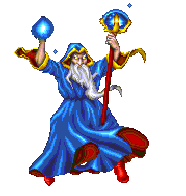Arguing Reality
Inspired by reading the inspiration for the original strip involving Dave’s cow in 'Knights of the Dinner Table: Bundle of Trouble Vol 6' (essentially, the author remembered a time when he sat out a game but listened to his friends argue endlessly about senseless details), I thought about 'reality' in role-playing games, especially fantasy role-playing games. Many game companies make sales by producing excessive volumes of superfluous rules, somehow convincing gamers that such excessive details of reality make for a better game. The truth is, games are not supposed to recreate reality, and no amount of details can ever do that (Gygax knew what he was talking about when he addressed this very issue in the original AD&D).
A question of realism can be a hard one to solve, as most games are fantasy games, and thus, everyone wants the rules of reality to apply when it is most convenient for them. The GM simply cannot let reality run rough-shod over his game, because when it's most convenient for the players, it is least convenient for the monsters, and he has to be fair. Sometimes, however, players need a sledge hammer to remind them of what reality is. For example, players almost always think they can just down healing potion after healing potion in battle because, well, they're healing potions. Well, potions are good for being used after the battle, but players sitting around a table who prefer fantasy combat because they don't have the knads for real-life fighting don't have a clue what battle is like, and so all their arguments of reality are to laugh. Furthering the potion example, ask the stubborn player if he can down a soda pop in six seconds (the standard length of a 'round' in most games) while the other players are free to wrestle it away from him (or beat on him with whatever impromptu weapons they choose). Even in this 'soft' version of battle, one can easily see just how stupid one's argument of 'hiding around a pillar to guzzle potions while the Orcs coincidentily forget about the one who decapitated their master' is.
Role-playing can be played many ways, such as an incredible game of tactics, or, as we prefer, as interactive storytelling. Reality-details are for tacticals, and if you're playing a tactical game, it's not a storytelling game. Alas, many a gamer wants both, but that's the same as mixing oil and water, and, as always, it only creates a mess. We at New Dimension Games have chosen to focus on the interactive storytelling that an RPG can be. In this dance between GM and Players, details of reality (as we know it) are one of many tools, but they are not the rules. Indeed, reality-details are A tool, not THE rule. We play these games for excitement and drama, not number crunching. Drama and excitement are due to clearly ubnderstood cause and effect, not long lapses of play-time due to squabbles about the size of snowflakes. The simpler the rules, the more readily the drama comes into the game—things are clear-cut, leaving no room for cowards to try and weasel out of their peril by flipping through the pages for some piddy rule to save their sorry ass. Simple, clear-cut, cause-and-effect brings all the excitement right up to your game table. Those who try to create some psuedo-reality with rules and more rules and more rules are not role-playing—they are rule-playing. Keep the rules simple. Let the dice fall where they may. Take the bad with the good. Have an adventure!

If you wish to use the proper fonts for this and other pages they are available here as a zip file.















